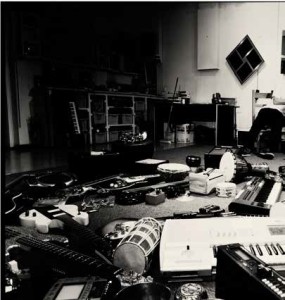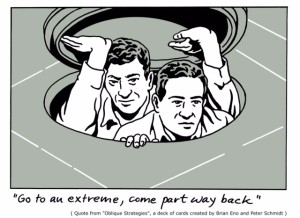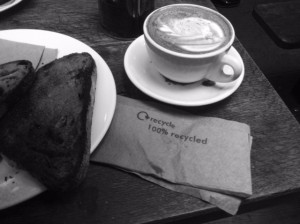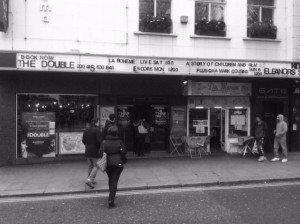Michael: There’s a raw energy, not only in the dark corners of the songs!
Brian: It was really exciting, the singing part of it, because, as you know I haven’t done any recording singing for a while, but I love singing. I have this music group every week, and we sing for three hours or more. So that’s how I keep going, I think. If I didn’t have the group, I’d probably do a lot more singing on records (laughs).
Michael: So, please stop that a cappella thing now! In the penultimate song, „When I Built This World“, you’re adopting the voice of an evil god who brings with all bad intentions, guilt and sin into this world. By heavily treating your voice, you’re continuing that „theatre of voices“ which we talked about around the time your last song album, „Another Day On Earth“, was released. And then the music sounds highly energetic in the long instrumental second half …
Brian: I should tell you the original name of this project. I started some of these pieces a long time ago, and it wasn’t really until I started working with Karl that I realized there was a way to finish them – they were just pieces of music that were sitting on my shelves that I had taken to a certain point and didn’t quite know how to finish. I had this idea of making a kind of music where Fela Kuti and Steve Reich would meet, something that was half way between them, and other things of course, but that was the point that rhythmically it had the intricacy of Fela Kuti, but it had the sort of persistence of Steve Reich, and the refusal to stop. And actually what we’re working on now is much more in that direction. On Someday World the things turned into songs rather unexpectedly, so this record wasn’t the end of the „Reikuti“-project, anyway, „Reikuti“, that was what I called it in my mind, and on that song, the last section was the place where we decided to try to do that. I said we’ve got at least one bit of where we do what we originally intended to do.

Michael: When you started a long series of public talks, two prominent words were „perfume“ and „haircut“. Nowadays the central word is „surrender“ though this concept leads back a long time to the early years of your „ambient music“ in the 70s. The artistic response to that was somehow reluctant. Maybe groups like Duran Duran or Depeche Mode sang about haircuts and perfumes, but without getting the point. Now, artists seem to relate to the ideas behind that word „surrender“. To my delight, you’re singing, too, on the new albums of Damon Albarn and Owen Pallett. Both albums seem to have a knack for „surrender“. Owen’s work is about addiction in all its apparitions, and he even sings the s-word (here I’m laughing). And Damon Albarn has done a kind of quiet work …
Brian: A lot of Damon’s album is quite reflective. It’s not melancholy, regretful, or: „Oh, those were such wonderful days“. It’s more like thinking about your life and thinking: „Oh, yes, I wonder what I was really doing then, I see, yes …“, because your life is a story you keep retelling yourself, and you keep suddenly realizing that the story wasn’t quite like that. As I say, when I look back in my old notebooks and even when I listen to recordings I’ve done in the past I think: who was the person who did that? If you don’t have any way of looking back, you tend to think that your life is a sort of continuous identity. But if you have a way of checking that, it isn’t true. You’re absolutely changing the whole time, and you know, if I didn’t have a diary or notebooks or recordings, I would probably have stitched together a story of my life that made perfect sense. It’s only that I have all that evidence, that it wasn’t making sense at the time, that I really didn’t know what was going on.
Michael: You’re singing on „Heavy Seas of Love“, the final track.
Brian: Damon asked me if I would help him on it, and in particular with that last song of his album. He had only written the main part of it (Eno sings „Heavy ways of love“), and he said I want another part in that song. So I wrote something completely separate, it doesn’t flow with his song, it’s a deliberate change of scene like you might do in a film more than you do in a piece of music. In a film it’s quite acceptable to suddenly switch location, you don’t do that very much in music.

Michael: Okay, now I’m switching location – different time, different place. A personal thing. Some months ago I met a woman. After thirty years I saw her coming back on stage with the old band. When their record came out, many people were blown away by the strange nakedness of the music. A cheap rhythm box, a sparse input from guitar and bass guitar, an old primitive organ – and this voice of a woman that sounded like she would be singing simple melodies at a bus stop. A dreamlike atmosphere. I always thought you must have loved their album. And Alison Statton didn’t see herself as a singer, as she told me, but as a vocalist. By the way, she told me, too, that at the time of the production of their one and only album, they had listened to „Another Green World“ in the morning, in the evening… that music was a dear companion for them.
Brian: Ohh.
Michael: It’s „Colossal Youth“, by the Young Marble Giants.
Brian: Gosh, I’ve never ever heard of them!
(Another moment of silence)
Michael: No, I can’t believe that … Really?! This was a record I could get lost in like … like in „Discreet Music“. It came out in 1981, it’s today regarded as a classic. I think it was even then regarded as an „instant classic“, and for all the good reasons. Let me think: by that time you would’ve been in New York. I mean this all must appeal to you.
Brian: Definitely.
Karl: (in the background) I have a story! (Karl’s switching location, too. Brian stands up, listens closely to what Karl’s saying)

Karl: Allow me to guest in your chair, this is a very nicely warmed chair by Brian. Well, we all came from Cardiff. They were in Cardiff, we were in Cardiff. So it was a sort of crossover time when power pop and new wave was making waves as something else. And there was this little group of artists in Cardiff that were making some other music. It didn’t make any sense at all, but it’s a little bit – there’s a film I’m trying to think of now where I’m reminded … where you go and see something and you know it’s the broom that’s sweeping you off the streets. There was a couple of groups at that time, who were doing things that were kind of Gang of Four-ish, and then there was the Young Marble Giants, and we went to see them one day, my band and I. We went to see them in this little cafe, with maybe a dozen utmost people in this cafe, and they had this little cassette-machine with this rhythm on it, and a bass player, and a guitarist, and this girl’s singing lalalalaa (Karl imitates a naive way of lalala-singing), and every song was like that, and I just remember guys crushing cans with extreme boredom, and frustration: when is it gonna have a crescendo? When is there gonna be some passion? And it was so restrained. We all came out of it and went: „Oh my god, if I never hear that again, it will be too soon“. And at the time, I remember saying, thinking, mmmhhhmmm, mmhhmmm, may be that’s just a new music that we’re not prepared for yet, were still focussed on being pop stars and trying to be Elvis Costello, and all the other people. And the guys come along and have done this thing. And they were the first of the new wave of artists that came out of Wales. We got others … they were kind of based in Rock’n’Roll, or guitar-based rock music, and some great players, but they were the first really in a long time to do anything that meant something special. They really tapped into something, and I like the album now!

Part 1/4
Part 2/4
Part 4/4
2014 1 Mai
“Between The Stone & The Ocean” – an interview with Brian Eno (and special guest Karl Hyde) – Part 3/4
von: Michael Engelbrecht Filed under: Blog | TB | 6 Comments
6 Comments
-
Michael Engelbrecht:
HEAVY SEAS OF LOVE
When your soul isn’t right
And it’s raw to the night
It’s in your hands
When the traces of dark come
To fade in the light
You’re in safe handsHeavy seas of love
Radiance is in you
As above so below
On the heavy seas of loveHeavy seas of love
We come together in you
Counting out the new moons
On the heavy seas of loveWhen the world is to tall
You can jump you won’t fall
You’re in safe hands
What the day will now give
How those seeds will now live
It’s in your handsHeavy seeds of love
Radiance is in you
As above so below
On the heavy seas of love
-
Michael Engelbrecht:
DADDY’S CAR
Faster than your Daddy’s car
North Star
Half Moon
Torchlight
Fire
Street light
ShimmeringFaster than your Daddy’s Car
Knuckles like lanterns
Laughter in the dark
Children in the dark
Glowing
Bronzed and stress-free Father’s
Voices -
Markus Muench:
Hallo Michael Engelbrecht,
vielen Dank für das interessante Interview! Die neue ENO/HYDE CD ist schlicht fantastisch. Besonders interessiert mich die Verbindung zu Steve Reich/Fela Kuti:
„I had this idea of making a kind of music where Fela Kuti and Steve Reich would meet, something that was half way between them, and other things of course, but that was the point that rhythmically it had the intricacy of Fela Kuti, but it had the sort of persistence of Steve Reich, and the refusal to stop. And actually what we’re working on now is much more in that direction.“
So wie ich es dem Kontext entnehme, bezieht sich Brian Eno hier nicht auf Someday World, sondern auf seine aktuelle Arbeit. Wissen Sie eventuell darüber Näheres?
Vielen Dank!
-
Michael Engelbrecht:
Die Arbeit an Someday World hat soviel Energie freigesetzt, dass das „Reikuti“-Projekt ungebremst weiterging. Ich war ja dabei, als Eno & Hyde an neuen Tracks arbeiteten. Und da kamen über Wochen noch weitere Musiker ins Spiel. Ich denke, es wird 2014/2015 eine neue CD geben, das Material dazu dürfte kurz vor der Fertigstellung sein. Aber natürlich können auch da Abweichngen von den ursprünglichen Ideen stattfinden. Warten sollte man nicht darauf. Irgendetwas Neues könnte die Aufmerksamkeit binden. Bei Brian gilt: you never know :)
-
Michael Engelbrecht:
… eine weitere Nachricht von Markus Münch:
„Sagen Sie bitte Brian einen schönen Gruß: Ich höre das neue Album seit 4 Tagen fast non-stop im Auto, S-Bahnen, zu Fuß und zuhause.
Natürlich warte ich auf sein nächstes Reikuti-Album, zumal es noch stärker in diese Richtung gehen soll. Ich bin auch deshalb sehr interessiert daran, da ich selbst mit einem ähnlichen Pop-Projekt vor ca 1 Jahr begonnen habe (Reich + Ryoji Ikeda + sort of finnish harmony).
Doch kurz nach Beginn habe ich es wieder auf Eis gelegt und jetzt durch Someday World wieder Motivation gefunden es doch weiter zu verfolgen.“
-
Markus Muench:
Thanks for posting Michael.
There are many connections to Reichs works in Enos new CD I enjoy very much.
For example: „A Man Wakes Up“.
The song starts with only some bits of sounds/ motives that are build up. The african influenced bass riff starts with less notes and grows to a 4 bar pattern by adding more notes. The structure is not a typical song form and the harmony does not chance in the first half of the song. After a while it grows into a very polyphonic african band piece with more and more energy and changing harmony. In the last bars you can hear a choir („eee-ooo“) that reminds you of voices from Steve Reichs „Music for Mallet Instruments Voices and Organ“ or Philip Glass early vocal works. What a great combination!